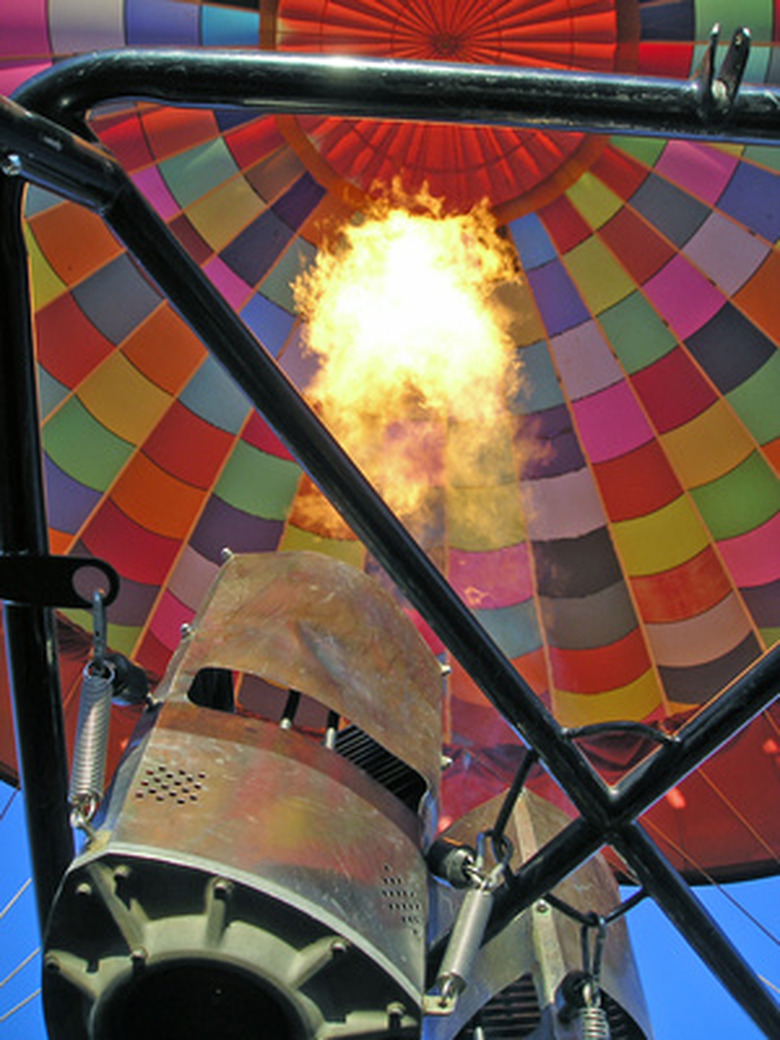Why Burning Propane Makes Water
Propane is a gas that many people are familiar with but few people understand. If an individual wants to know more about propane, combustion and why water is formed, it's important to understand the way atoms interact during combustion. The formation of water is produced by a combination of oxygen, propane and carbon dioxide during the combustion process.
Description
Description
Propane is a gas that's produced during petroleum production. Propane is a three-carbon alkane (a molecule composed of three carbons and five hydrogen atoms). Because it's nontoxic and clean-burning, propane is used to heat homes and cook food. Propane is also used in a variety of other applications, such as welding, and as an alternative to gasoline. Propane is heavier than air and will "pool" in low areas, creating a potentially dangerous situation.
Composition
Composition
Propane reactions occur due to the give and take of atoms. Protons and electrons carry a charge that's either positive (protons) or negative (electrons), which determines the properties of their associated atoms. Chemical reactions occur whenever there's some form of chemical imbalance; the reaction changes the properties of the associated compound. This is how water and carbon dioxide can be formed during combustion.
Combustion
Combustion
Water becomes a by-product of propane through the process of combustion. Combustion occurs when there's between 1.8 percent to 8.6 percent propane and 91.4 percent to 98.2 percent air. Any more or less propane, and combustion can't occur completely. This results in an improper equation and creates deadly carbon monoxide gas. The equation for the complete combustion of propane is as follows: 3CH8 + 5O2 > 3CO2 + 4H2O.
Water Production
Water Production
Propane's three-carbon alkane (3CH8) is added to five molecules of oxygen (O5). When heat is applied to the mixture, combustion occurs, and the atoms begin to interact violently. The electrons and protons push and pull on each other until balance is restored, creating carbon dioxide (3CO2) and water (4H2O). This process is continued until the propane, oxygen or heat is exhausted. The combustion of propane then results in the creation of relatively large amounts of water.
Usability
Usability
The water produced by propane mixing with too little oxygen is unusable for most applications, such as drinking water. In fact, the water vapor is so minimal that usually the water burns up right along with the propane. It's actually the evaporating water, combined with carbon dioxide emissions, that causes propane to burn with a visible flame.
Cite This Article
MLA
Priddy, Brenda. "Why Burning Propane Makes Water" sciencing.com, https://www.sciencing.com/burning-propane-water-6635338/. 24 April 2017.
APA
Priddy, Brenda. (2017, April 24). Why Burning Propane Makes Water. sciencing.com. Retrieved from https://www.sciencing.com/burning-propane-water-6635338/
Chicago
Priddy, Brenda. Why Burning Propane Makes Water last modified March 24, 2022. https://www.sciencing.com/burning-propane-water-6635338/
